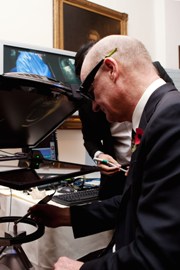MP tries University's virtual reality technology
Release Date 16 November 2012

The Rt Hon David Willetts MP, Minister of State for Universities and Science, tried his skills at dentistry at an event to celebrate Technology Enhanced Learning at The Royal Society.
Luckily, no human guinea pigs were needed as he was trying out innovative virtual reality technology that replicates the look, feel and even sounds of operating on a real human, developed by scientists at the University of Reading.
The groundbreaking technology allows dental students to safely and effectively practise their techniques and skills without needing to use traditional methods of operating on dummies.
Professor William Harwin, School of Systems Engineering at the University of Reading, led the Technical Development Team: "The hapTEL workstation brings new methods of integrating advanced visualisation tools that include the three primary senses, vision, touch and sound to the area of learning complex skills. Dental education is a great test for these ideas since it requires sophisticated skills that are coordinated with deep knowledge.
"The hapTEL interface demonstrates the unique way in which touch supports vision, and in this case, will allow trainee dentists multiple attempts at cavity drilling and provide their instructors with better review tools."
The hapTEL Virtual Dental Lab was launched at King's College London Dental Institute, where they have integrated Virtual reality haptic systems in the dental undergraduate curriculum.
The technology was developed in a £1.5 million 4 year project as part of the Technology Enhanced Learning projects to improve the quality of formal and informal learning, and to make accessible forms of knowledge that were simply inaccessible before. The project was one of eight funded jointly by the Engineering and Physical Sciences Research Council (EPSRC) and the Economic and Social Research Council (ESRC).
The University of Reading's School of Systems Engineering led the technical development of the hapTEL interface, developing the haptics, tooth visualisation, tooth cutting software, workstations, and the human-computer interaction.
The School of Systems Engineering has a unique mix of skills in Information Technology, Computer Science, Cybernetics, Electronic Engineering, Embedded Systems, Robotics, Communications, Feedback and Control, grounded in firm scientific and engineering principles.
More information can be found at:
